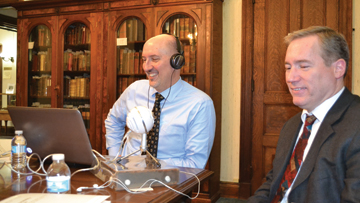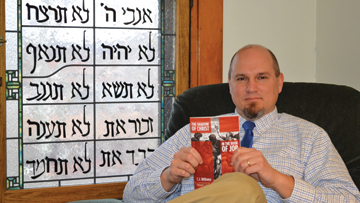You have free articles remaining this month.
Subscribe to the RP Witness for full access to new articles and the complete archives.
For 207 years, the pastor/professors at the Reformed Presbyterian Theological Seminary (RPTS) have instructed generations of pastors and others who have served in the kingdom of God. Shoulder-to-shoulder mentoring is one of the more unique features of the seminary. The practical outworking of “Study under Pastors,” the seminary’s tagline, takes place in many forms and utilizes several forms of media. Perhaps one of the less considered methods is the written word. Dr. C. J. Williams, Dr. Jeffrey Stivason, and Reverend Barry York are all active in using this method.
Christ’s Redemptive Suffering
“Writing is an important facet of ministry,” observes Dr. C. J. Williams. “Multiple generations of Christians and the unsaved can benefit from a pastor’s written work.” Williams, professor of Old Testament studies at RPTS, recently published The Shadow of Christ in the Book of Job. This work focuses upon the Christology found in Job. While many writers of the Patristic era devoted time to this aspect of the book, modern commentators have largely neglected this foreshadowing of Jesus.
Modern readers see the suffering of innocent Job, but they fail to recognize that this suffering is not the typical suffering of humans; rather, it prefigures the suffering of Christ. The book of Job is a reminder of how little Christians see God’s bigger picture in their own lives. The New Testament, reflects Williams, provides a unique vantage point in understanding the purpose of suffering and trials in the adding of perseverance to our faith, which produces patience. Even though Job seemingly fails at patience, Dr. Williams reminds his readers that lament and “frank expressions of the heart” have a place in the prayers of God’s people, as seen in the Psalms.
While the book contains theological depth, Dr. Williams believes it is easily accessible and will be a blessing and use to all in the church. Job is meant to instill an abounding faith in and love for the suffering Savior. “We, like Job, are called to reflect something of the patience of our Savior who suffered. There are no more types of Christ being sent by God into this world; the shadows have given way to reality. The typology that made Job so unique is now brought down to the place of our common calling in Christ. If we endure any hardship with the patience of Christ, trusting His promise that our suffering will lead to glory, we may take our place alongside Job and among those who endure and are counted blessed (Jas. 5:11).” From his teaching at the seminary and pastoring Providence (Pittsburgh, Pa.) RPC, Dr. Williams understands the importance of sharing the truths of Scripture in a way that is comprehensible and accurate; hence this work.
Blogs and Books
Taking the written ministry in a new direction at RPTS, Rev. Barry York, professor of pastoral theology and president-elect of RPTS, has ventured into the world of blogging through his Gentle Reformation (GR). Many Reformed pastors and scholars are blogging today, with lively content coming from the likes of David Murray and Tim Challies. The Alliance of Confessing Evangelicals and many other organizations produce excellent, high-quality materials every week. There is, though, a darker side of blogging, what York calls the “Loud and Proud.” These writers, while often on target with their content, can be offensive in their discussion of and writings about Reformed theology.
Encouraged by Russ Pulliam, elder at Second (Indianapolis, Ind.) and associate editor for the Indianapolis Star, Professor York and a delightful group of like-minded brothers have collaborated with Reformed and Presbyterian pastors from the United States, Scotland, and Northern Ireland. The aim of the blog is to address, in a gentlemanly way, issues in our culture, to give a voice to less abrasive Reformed people. These men desire their writing to be pastoral rather than pejorative, and their writing is aimed at the folks in the pews, not academicians.
Barry York finds great joy in many aspects of blogging, particularly with the Gentle Reformation crew. There is a great sense of excitement when another blog picks up a GR piece and reposts it. Mega-blogger Tim Challies highlighted GR as one of the top 10 blogs for 2016. York notes the blessing of reviewing comments from readers who have been encouraged by the blog’s content.
While not a written word, another aspect of Prof. York’s ministry is 3GT, Three Guys Theologizing. This podcast features Barry York, Kyle Borg, and Aaron Sams discussing various aspects of culture and its intersection with the kingdom of Christ. Topics have included technology, the Lord’s supper, Sabbath observance, prayer, and pastoral revival.
Prof. York finished a doctor of ministry degree at Reformed Theological Seminary in Orlando, Fla., and graduates in May. His studies on the marks of the church led to a manuscript that is currently being considered by several publishers. Titled Missing the Marks: Rediscovering and Restoring the Essential Identity of the Church, this work aims at keeping the church focused on the proclamation of the gospel of Jesus Christ.
Upholding the God-Breathed Word
Another RPTS professor, Dr. Jeff Stivason, adjunct professor of systematic theology, is also deeply involved in blogging and writing. Released this past February, Dr. Stivason’s book comes from his doctoral work at Westminster Theological Seminary in Philadelphia. It is titled From Inscrutability to Concursus: Benjamin B. Warfield’s Theological Construction of Revelation’s Mode from 1880 to 1915. This title may have some readers scrambling for a dictionary, but that should not deter folks from picking up a copy of this work. Stivason notes that this book is academic but has value to the layman as it pertains to the vital issue of biblical inspiration. The first half delves deeply into the background of Warfield: his interactions with A. A. Hodge and the intense theological war with Charles Briggs over scriptural revelation and inspiration. The second half is an extensive evaluation of the theological debates concerning inspiration that took place at Princeton Theological Seminary at the turn of the 20th Century.
This was not his first choice of dissertation topics, but Dr. Stivason was swayed by the influence of his advisor, Dr. Lane Tipton, to tackle this foundational issue. The negative impact of the theological shift away from the beliefs held by the Reformed Presbyterian Church of North America and several other Reformed and Presbyterian denominations, is seen quite plainly in the doctrine of many churches and theologians today. The Bible, these churches and teachers argue, is a fluid document, and therefore cannot possibly be the Word of God. Stivason’s work draws attention to B. B. Warfield’s efforts to correct this critical theological error.
Jeff Stivason spent 18 months in intensive study of Warfield’s life and another five months writing his dissertation. “I spent so much time with Warfield and sharing what I learned with my family,” recalls Dr. Stivason, “that Warfield became like a mentor because of this close relationship.”
Stivason, pastor of Grace (Gibsonia, Pa.), RPC, comments upon the differences between theological writing and preaching: “Writing is a very different aspect of ministry. There is no real return for your work, such as feedback from the congregation, like you get when you’re preaching or teaching a class. The author must develop a love for this ministry because you can’t always see its fruit.” As such, it keeps one humble.
Dr. Stivason also has a writing outlet with a more direct line of feedback. He is the managing editor and a contributor for the blog Place for Truth, sponsored by the Alliance of Confessing Evangelicals. This blog contains a range of accessible articles covering church history along with biblical, systematic, and practical theology to equip the church to “maintain the gains of the Protestant Reformation.”
Other Resources from RPTS
Dr. Richard Gamble’s second volume of The Whole Counsel of God is currently at the publisher, with an anticipated release date in late 2017 or early 2018. Dr. Jerry O’Neill, President of RPTS, recently had an article on mentorship in the magazine Tabletalk. The faculty publishes a biannual online journal, The Reformed Presbyterian Theological Journal, which can be found on the seminary’s web site under the Resources tab. The fall edition is based on the content of the seminary’s Westminster Conference held at RPTS every September. The 2016 issue focused on the topic of providence. The fall 2017 issue will be on the life and ministry of Martin Luther, as it will be during the celebration of the 500th anniversary of his 95 theses being nailed to the door in Wittenberg. The spring issue is usually non-thematic, but intended as a blessing for the church as a whole.
Dr. O’Neill reflects, “I believe you will find the Reformed Presbyterian Theological Journal to be a professional journal that reflects the ministry of this seminary—a theological journal that will be both scholarly and pastoral in tone. We pray that this journal will be helpful to the church as we seek to raise up shepherds who feed the flock and minister to the souls of all who are under their care.”
Every day we encounter writing. The written word is one of the major ways we communicate with each other. Our most important concepts, ideas, contracts, and agreements are captured in writing. Some of man’s most treasured possessions are books and documents from years past, items that people purchase for millions of dollars.
As our culture turns away from the truths of Christ, it is vital for faithful Christians to continue to impact the world through writing. The RPCNA has a long history of impacting the world through the proclamation of the gospel and the defense of Christianity. Please pray that the Lord would see fit to use the works noted above to further His kingdom.
Mark Sampson is Director of Institutional Advancement and Chief Administrative Officer at RPTS.

